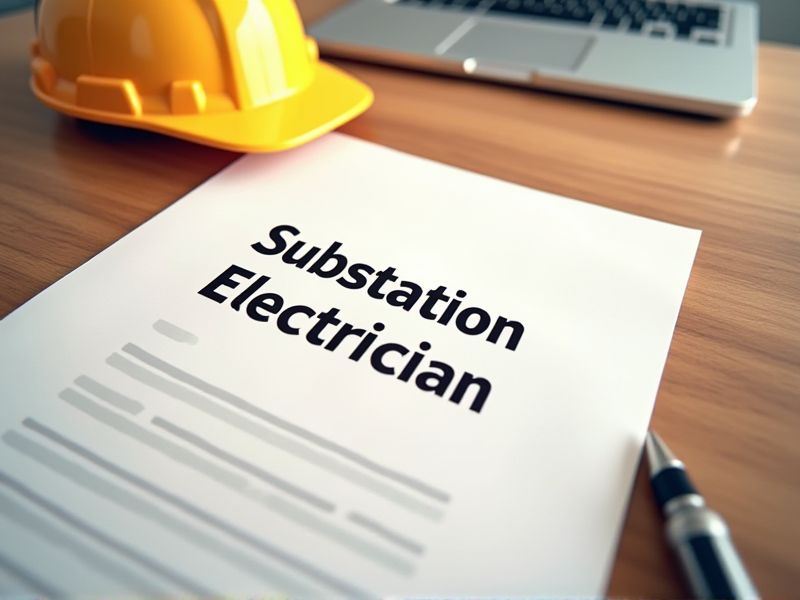
Substation Electricians work in highly specialized environments dealing with complex electrical systems, requiring specific technical knowledge and skills. Certifications ensure that these electricians adhere to industry standards and can safely manage the high-voltage equipment crucial to power distribution. They also provide a benchmark for evaluating an electrician's expertise and reliability in handling routine maintenance and emergency repairs. Here are some essential certifications you may need to become a Substation Electrician.
Journeyman Electrician License
Without a Journeyman Electrician License, a substation electrician may not meet regulatory compliance, increasing legal risks for employers. This license validates an electrician's expertise in handling high-voltage equipment, mandatory for ensuring the safety and reliability of substation operations. It also facilitates career advancement by demonstrating competencies needed to oversee apprentices and manage complex tasks. The license ensures adherence to industry standards, reducing the likelihood of electrical failures and promoting operational efficiency.
OSHA 10-Hour Construction Safety Certification
Substation electricians face numerous hazards, and the OSHA 10-Hour Construction Safety Certification helps in reducing workplace injuries through safety protocol education. The certification provides knowledge on identifying potential risks such as electrical hazards and working at heights. Compliance with OSHA standards can lead to decreased accident-related downtime. Regulatory agencies often require this certification to ensure safety measures are implemented effectively at construction sites.
OSHA 30-Hour Construction Safety Certification
The OSHA 30-Hour Construction Safety Certification ensures substation electricians are well-informed about workplace safety protocols, reducing the risk of accidents. By understanding hazard identification and prevention, electricians contribute to a safer work environment. Exposure to safety standards and regulations fosters compliance and minimizes potential legal liabilities for employers. Adequate training in emergency response procedures equips electricians to effectively handle unforeseen incidents, ensuring operational continuity.
NFPA 70E Electrical Safety Certification
NFPA 70E Electrical Safety Certification ensures substation electricians understand critical safety standards, reducing the risk of electrical hazards. Compliance with this certification leads to fewer workplace accidents, promoting a safer working environment. Employers benefit from having certified electricians by minimizing potential legal liabilities and insurance costs. Knowledge gained through this certification enables electricians to implement effective safety protocols, enhancing operational efficiency.
Arc Flash Awareness and PPE Certification
Substation electricians face significant risks from arc flashes, which can cause severe burns and injuries. Proper arc flash awareness training reduces the likelihood of accidents by educating personnel about potential hazards and safe work practices. Personal Protective Equipment (PPE) certification ensures that electricians use the appropriate gear, which meets regulated safety standards to effectively shield against arc flash incidents. Employers who emphasize arc flash awareness and PPE certification reduce liability and enhance workplace safety compliance, thus decreasing the frequency of workplace incidents.
Confined Space Entry and Rescue Certification
Substation electricians often work in confined spaces, where electrical hazards significantly increase the risk of accidents. Confined Space Entry and Rescue Certification equips them with necessary skills to safely navigate these environments. Lack of such certification can lead to inadequate emergency response, exacerbating injury risk during unexpected incidents. Regulatory compliance mandates this certification, ensuring standardized safety practices in hazardous workplaces.
Lockout/Tagout (LOTO) Certification
Lockout/Tagout (LOTO) Certification is needed for substation electricians to prevent accidental energization during maintenance, ensuring worker safety. Electrical equipment often remains live, posing significant hazards, so LOTO procedures effectively control these risks. Regulatory bodies like OSHA mandate LOTO compliance to minimize occupational injuries in high-risk environments. Substation electricians gain critical skills to correctly implement energy isolation and adhere to safety protocols through certification, reducing liability for employers.
CPR/First Aid Certification
CPR/First Aid Certification for a Substation Electrician ensures they can respond effectively to electrical accidents, which reduces the risk of fatalities. The complex and high-risk nature of electrical environments increases the likelihood of emergencies, necessitating quick intervention skills. Certified electricians contribute to workplace safety by being equipped to handle potential injuries until professional medical help arrives. The certification demonstrates a commitment to safety standards and compliance with industry regulations.
High Voltage Safety Training Certification
High Voltage Safety Training Certification is essential for substation electricians because it equips them with the necessary skills to handle electrical hazards, reducing the risk of accidents. Direct exposure to high voltage environments without proper training can lead to severe injuries or fatalities. Certification ensures compliance with industry safety standards, which is crucial for both employer liability and employee protection. Moreover, trained electricians are more efficient in troubleshooting and maintenance, minimizing costly downtimes.
Electrical Testing and Commissioning Certification
Electrical Testing and Commissioning Certification ensures that a substation electrician possesses the necessary technical knowledge and skills to safely and effectively handle complex electrical systems. Substations require precise operation and maintenance, and this certification guarantees the capability to identify and address potential faults. Compliance with industry standards and regulations is critical, and certified electricians are equipped to meet these stringent requirements. Proper certification enhances job opportunities and career growth, reflecting a commitment to professional excellence and safety in the field.
Summary
When you obtain certifications as a Substation Electrician, your expertise and credibility tend to increase significantly. These certifications often lead to better job opportunities and potential salary boosts. They may enhance your skills in dealing with complex electrical systems, thereby improving your work efficiency. Employers likely see you as a valuable asset, which might result in increased job security and professional growth.
